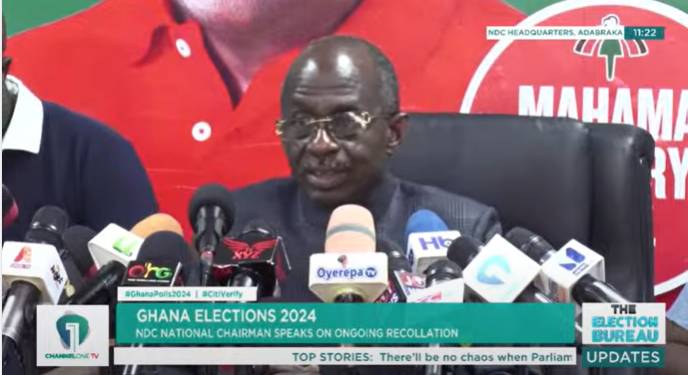The National Chairman of the National Democratic Congress (NDC), Johnson Asiedu Nketiah, has described the Electoral Commission's (EC) decision to conduct a re-collation of election results at the Police Training School as unlawful. The ongoing exercise, which involves results from four constituencies in the Eastern Region, has sparked widespread controversy and raised concerns about its legal foundation.
Speaking at a press conference on Friday, December 13, Asiedu Nketiah expressed his dissatisfaction with the process, asserting that the re-collation for the Suhum, Nsawam Adoagyiri, Fanteakwa North, and Akwatia constituencies lacked any legitimate basis in electoral laws or procedures.
He stated, "We in the NDC believe that what is happening at the police training school amounts to an illegality. It is not founded in any laws of our elections. Neither is it based on a consensus between the parties and the EC."
The NDC leader's remarks come amid disputes surrounding the initial collation of results in these constituencies. The EC, in response to concerns raised during the collation process, ordered the re-collation exercise on December 12. However, this decision has been met with resistance from the NDC, which views the move as a violation of democratic principles.
Asiedu Nketiah did not mince words when addressing the EC’s actions, emphasizing that such processes must be conducted transparently and within the confines of the law. He also issued a caution to officials of the EC and the police involved in the re-collation, warning of potential consequences in the future.
"We want to inform the nation and to give notice to any official of the commission and the police who are involved in the perpetuation of that illegality to know that there could be consequences of their actions in the future," he declared.
The contentious re-collation has brought into sharp focus the broader challenges surrounding Ghana’s 2024 elections. While the EC has defended its decision as an effort to ensure accuracy and fairness in the results, critics, particularly within the NDC, see it as an attempt to undermine the integrity of the electoral process.
Asiedu Nketiah’s comments reflect growing frustration within the NDC over what they perceive as irregularities in the management of the elections. Party officials have questioned the timing and location of the re-collation, arguing that it deviates from established protocols.
For the NDC, the stakes in the affected constituencies are high. These areas have been hotly contested, and any perceived manipulation of results could have significant implications for the party's overall performance in the elections.
The decision to conduct the re-collation at the Police Training School has also drawn criticism from civil society groups and political analysts. Many have called for greater transparency in the process, urging the EC to ensure that all stakeholders are adequately consulted and involved.
Asiedu Nketiah’s warning to EC officials underscores the NDC’s determination to challenge any actions that they believe undermine democratic principles. The party has already taken legal steps to address their concerns, securing a court injunction to halt the re-collation in the Nsawam Adoagyiri constituency.
The legal battle over the re-collation is likely to intensify in the coming days, with both sides digging in their heels. For the NDC, the issue is not just about the results of a few constituencies but about safeguarding the integrity of Ghana’s electoral system.
Asiedu Nketiah's statements have struck a chord with many Ghanaians who are concerned about the potential implications of the re-collation exercise. The NDC leader’s call for accountability and adherence to the law has resonated with supporters of the party and advocates for democratic governance.
While the EC has yet to respond directly to Asiedu Nketiah’s allegations, the re-collation process remains a contentious issue that could have far-reaching implications for Ghana's democracy. As the 2024 elections continue to unfold, the handling of disputes such as this one will be critical in determining public confidence in the electoral system.
The NDC’s stance on the matter is clear: any action perceived as undermining the will of the people will be vigorously opposed. Asiedu Nketiah’s remarks serve as a reminder that the stakes are high, not just for the political parties involved but for the future of Ghana's democratic institutions.
With tensions running high, all eyes are on the EC to navigate this challenging period with fairness and transparency. Whether the re-collation exercise will proceed without further legal and political battles remains to be seen, but one thing is certain: the debate over its legitimacy will continue to dominate Ghana’s political landscape in the weeks ahead.




No comments yet
Be the first to share your thoughts!